
Monroe County is the southernmost county of the state of Florida. As of the 2020 census, the population was 82,874. Its county seat is Key West. Monroe County includes the islands of the Florida Keys and comprises the Key West-Key Largo Micropolitan Statistical Area. Over 99.9% of the county's population lives on the Florida Keys. The mainland, which is part of the Everglades, comprises 87% of the county's land area and is virtually uninhabited with only 17 people recorded in the 2020 census.

Key West is an island in the Straits of Florida, within the U.S. state of Florida. Together with all or parts of the separate islands of Dredgers Key, Fleming Key, Sunset Key, and the northern part of Stock Island, it constitutes the City of Key West.

Martello towers, sometimes known simply as Martellos, are small defensive forts that were built across the British Empire during the 19th century, from the time of the French Revolutionary Wars onwards. Most were coastal forts.
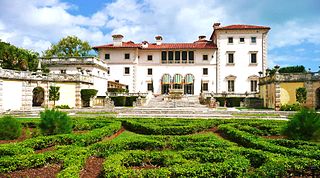
The Vizcaya Museum and Gardens, previously known as Villa Vizcaya, is the former villa and estate of businessman James Deering, of the Deering McCormick-International Harvester fortune, on Biscayne Bay in the present-day Coconut Grove neighborhood of Miami, Florida. The early 20th-century Vizcaya estate also includes extensive Italian Renaissance gardens, native woodland landscape, and a historic village outbuildings compound.

The Fort Zachary Taylor Historic State Park, also known simply as Fort Taylor, is a Florida State Park and National Historic Landmark centered on a Civil War-era fort located near the southern tip of Key West, Florida.
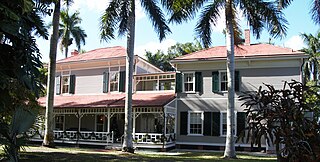
The Edison and Ford Winter Estates contain a historical museum and 21 acre botanical garden on the adjacent sites of the winter homes of Thomas Edison and Henry Ford beside the Caloosahatchee River in Southwestern Florida. It is located at 2350 McGregor Boulevard, Fort Myers, Florida.
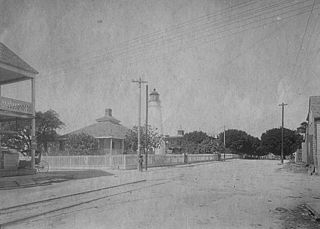
The Key West Lighthouse is located in Key West, Florida. The first Key West lighthouse was a 65-foot (20 m) tower completed in 1825. It had 15 lamps in 15-inch (380 mm) reflectors.
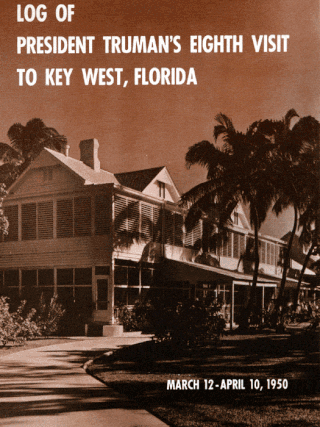
Truman Annex is both a neighborhood and military installation in Key West, Florida, United States. It is the part of the island that is west of Whitehead Street, with the exception of Bahama Village. The winter White House for President Harry S. Truman was located there, from its days as part of the former Naval Station Key West. The Harry S. Truman Little White House in Key West, Florida was the winter White House for President Truman for 175 days during 11 visits.

The Key West Historic District is a U.S. historic district located in Key West, Florida. It encompasses approximately 4,000 acres (16 km2), bounded by White, Angela, Windsor, Passover, Thomas and Whitehead Streets, and the Gulf of Mexico. It contains 187 historic buildings and one structure.

Fort Frederick is a historic military building located on Point Frederick on the grounds of the Royal Military College of Canada (RMC) in Kingston, Ontario, Canada. Its construction dates to 1846 and the Oregon boundary dispute. The fort consists of earthworks surrounding a Martello tower. Fort Frederick is included in two separate National Historic Sites of Canada: Kingston Fortifications National Historic Site and the Point Frederick Buildings National Historic Site.

The Custom House and Old Post Office is a historic site located at 281 Front Street, Key West, Florida, United States. On September 20, 1973, it was added to the U.S. National Register of Historic Places.

The Sugarloaf Key Bat Tower, also known as the Perky Bat Tower, is a historic site in Monroe County, Florida, United States. It is located a mile northwest of U.S. Route 1 on Lower Sugarloaf Key at mile marker 17. On May 13, 1982, it was added to the National Register of Historic Places. The tower was blown down during Hurricane Irma in 2017.

The West Martello Tower is a historic martello tower in Key West, Florida, United States. It is located at 1100 Atlantic Boulevard. On June 24, 1976, it was added to the U.S. National Register of Historic Places.

The Armory is a historic site in Key West, Florida, United States. It is located at 600 White Street. In 1971, it was added to the United States National Register of Historic Places.
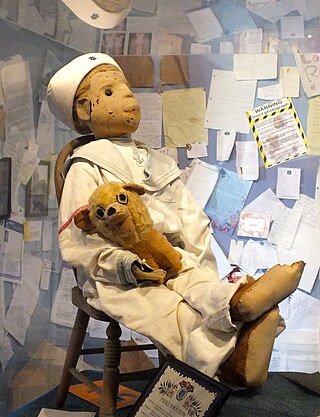
Robert the Doll is an allegedly haunted doll exhibited at the East Martello Museum in Key West, Florida. Robert was once owned by painter, author, and Key West resident Robert Eugene Otto.
The following is an alphabetical list of articles related to the U.S. state of Florida.

Fort Jefferson is a former U.S. military coastal fortress in the Dry Tortugas National Park of Florida. It is the largest brick masonry structure in the Americas, covering 16 acres (6.5 ha) and made with over 16 million bricks. Among United States forts, only Fort Monroe in Virginia and Fort Adams in Rhode Island are larger. The fort is located on Garden Key in the lower Florida Keys within the Dry Tortugas, 68 miles (109 km) west of the island of Key West. The Dry Tortugas are part of Monroe County in Florida.
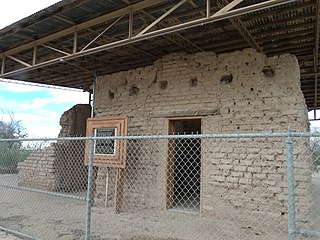
Fort Lowell was a United States Army post active from 1873 to 1891 on the outskirts of Tucson, Arizona. Fort Lowell was the successor to Camp Lowell, an earlier Army installation. The Army chose a location just south of the confluence of the Tanque Verde and Pantano creeks, at the point where they form the Rillito River, due to the year-round supply of water during that period. The Hohokam natives had chosen the site centuries earlier, presumably for the same reason. To this day, shards of Hohokam pottery can still be found in the area. The Army claimed a military reservation that encompassed approximately eighty square miles and extended east toward the Rincon Mountains.
The Civil War Trust's Civil War Discovery Trail is a heritage tourism program that links more than 600 U.S. Civil War sites in more than 30 states. The program is one of the White House Millennium Council's sixteen flagship National Millennium Trails. Sites on the trail include battlefields, museums, historic sites, forts and cemeteries.























